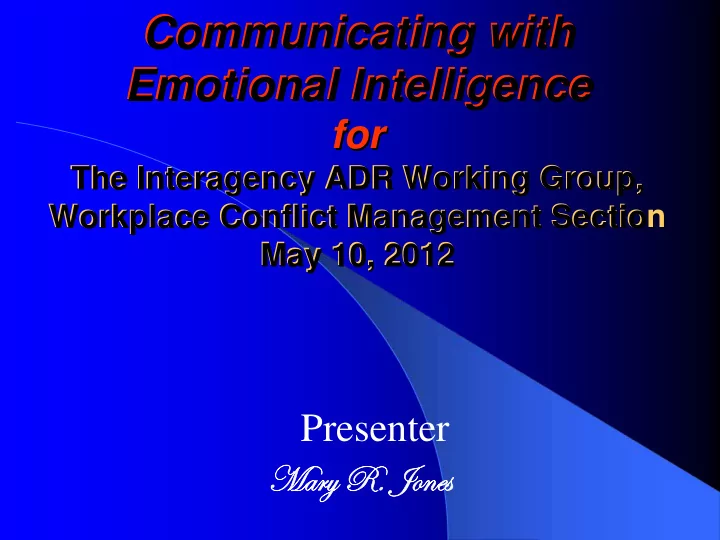

Communicating with Communicating with Emotional Intelligence Emotional Intelligence for for The Interagency ADR Working Group, The Interagency ADR Working Group, Workplace Conflict Management Sectio n Workplace Conflict Management Section May 10, 2012 May 10, 2012 Presenter `tÜç eA ]ÉÇxá `tÜç eA ]ÉÇxá
“We are being judged by a new yardstick; not just how smart we are, or by our training and expertise, but also how well we handle ourselves and each other.” Daniel Goleman, Ph.D. Working with Emotional Intelligence
AGENDA AGENDA EMOTIONAL INTELLIGENCE QUIZ BRIEF BACKGROUND OF EI BRIEF INTRODUCTION TO EI POWERPOINT PRESENTATION AUDIENCE PARTICIPATION WRAP-UP EXERCISE EVALUATION
Learning Objectives and Benefits • Understand emotional intelligence and why it is important to personal and professional success. • Recognize four domains of EI you can work on to increase your level of emotional intelligence. • Listen to and employ your emotions for better decision making. • Show you care, and build trust by displaying sensitivity and concern. • Use your energy and enthusiasm to motivate others.
EMOTIONAL INTELLIGENCE EMOTIONAL INTELLIGENCE QUIZ QUIZ This QUIZ is provided compliments of Emotional intelligence Services from EMOTIONAL INTELLIGENCE WORKBOOK CRM learning Daniel Goleman/Haygroup PLEASE TAKE 10 - MINUTES
What is Emotional Intelligence? Emotional intelligence is not about being nice all the time. • It is about being honest. Emotional intelligence is not about being “touchy-feely.” • It is about being aware of your feelings, and those of others. Emotional intelligence is not about being emotional. • It is about being smart with your emotions.
Personal Benefits of Emotional Intelligence • Greater career success • Stronger personal relationships • Increased optimism and confidence • Better health
Professional Benefits of Emotional Intelligence • Effective leadership skills • Improved communication • Less workplace conflict • Better problem solving skills • Increased likelihood of promotion
The Four Essential Competencies of Emotional Intelligence • Self-Awareness Relate to Ourselves • Self-Management • Social Awareness Relate to Others • Relationship Management
SELF AWARENESS
“If you understand your own feelings you get a really great handle on how you’re going to interact and perform with others… So one of the first starting points is, ‘what’s going on inside of me?’” Chuck Wolfe President, C. J. Wolfe Associates, LLC
Self-Awareness Competencies • Emotional self awareness : Reading one’s own emotions and recognizing their impact: using “gut-sense” to guide decisions. • Accurate self assessment: Knowing one’s strengths and limits. • Self confidence: Having a sound sense of one’s self- worth and capabilities.
Practicing Self-Awareness: • Awareness of our own emotional states is the foundation of all the E.I. skills. • Learn to “tune-in” to your emotions – they can give you valid information about your responses to stressful situations. • Recognize the importance of emotions even in “technical” fields.
SELF MANAGEMENT
Self-Management Competencies: • Emotional Self Control: Keeping disruptive emotions and impulses under control. • Transparency: Displaying honesty, integrity, and trustworthiness. • Adaptability: Demonstrating flexibility in adapting to changing situations or overcoming obstacles. • Achievement : Having the drive to improve performance to meet inner standards of excellence. • Initiative: Being ready to act and to seize opportunities. • Optimism: Seeing the “up side” in events
Practicing Self Management • Accept responsibility for choosing your own emotional responses. • Learn to “reframe” stressful situations into ones that are challenging. • Be aware of, and learn to manage, your own emotional “triggers.”
“High performers are those who are able to see with some clarity to what degree they are responsible for a setback and to what degree it may be circumstance or other people, and as a result they are able to be more persistent.” Dr. J.P. Pawliw-Fry Co-Director, Inst. For Health & Human Potential
“If people will stop for a moment and put themselves in another person’s shoes… it will help them modify their own behavior. It will help them develop relationships with those people.” Darryl Grigg, Ed.D. Co-Developer, American Express Emotional Competence Program
SOCIAL AWARENESS
"And so there's a real pay-off. The people who will become the leaders, the people who will become the star performers, are the ones who have the strengths in the key emotional intelligence abilities." Daniel Goleman, Ph.D. Founder, Emotional Intelligence Services
So cial Awareness Competencies: These Capabilities determine how we manage relationships • Empathy : Sensing others’ emotions, understanding their perspectives, and taking active interest in their concerns. • Organizational awareness : Reading the current, decision networks, and politics at the organizational levels. • Service: Recognizing and meeting follower, clients, or customer needs.
RELATIONSHIP RELATIONSHIP MANAGEMENT MANAGEMENT
Relationship Management Relationship Management Competencies: Competencies: Inspirational leadership : Guiding and motivating with a compelling vision. Influence : Using a range of tactics for persuasion. Developing others: Bolstering others’ abilities through feedback and guidance. Charge catalyst: Initiating, managing, and leading in a new direction. Conflict management : Resolving disagreements. Building bonds: Cultivating and maintaining a web of relationships. Teamwork and collaboration : Fostering cooperation and team building.
Creating Effective Relationships: Employ all your emotional competencies – awareness, management, social awareness – to: • Influence and persuade others. • Build consensus and support for team goals. • Motivate and inspire yourself and others to achieve those goals.
WRAP WRAP- UP EXERCISE -UP EXERCISE Name – Occupation – EI Score Name – Occupation – EI Score (optional) (optional) The most important thing I learned from the emotional intelligence training is---- Right now, I feel that I am strong in the competency of------ The emotional intelligence competency which I want to work on most is----- Specific things that I will do to raise my emotional intelligence are:
EVALUATIONS EVALUATIONS EI Quiz CRM learning www.crmlearning.com
Recommend
More recommend